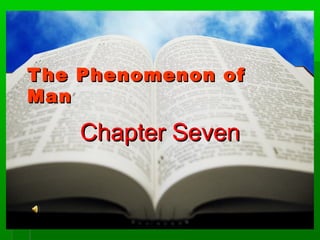The Phenomenon of Man Chapter Seven
•Télécharger en tant que PPT, PDF•
1 j'aime•1,645 vues
This document summarizes key points from Chapter Seven of Teilhard de Chardin's book "The Phenomenon of Man". It makes three main points: 1) Teilhard de Chardin sees man as the only significant link between the physical and spiritual orders, and as a being that knows he knows. He examines man solely as a phenomenon but covers the whole phenomenon. 2) Nothing exists in isolation, and science, philosophy and theology tend to converge in explaining the whole man. 3) Huxley asserts Teilhard's positions that mankind as a total phenomenon can be scientifically studied and analyzed, and that an evolutionary point of view is absolutely necessary. Huxley concludes the distillation of
Signaler
Partager
Signaler
Partager

Contenu connexe
Tendances (20)
En vedette
En vedette (20)
The natural friendship between science and spirituality

The natural friendship between science and spirituality
Chris Perkins - Living, loving and laughing: spirituality in the dementia unit

Chris Perkins - Living, loving and laughing: spirituality in the dementia unit
Similaire à The Phenomenon of Man Chapter Seven
Similaire à The Phenomenon of Man Chapter Seven (20)
Classic and Modern Philosophy: Rationalism and Empicism

Classic and Modern Philosophy: Rationalism and Empicism
CH2 - Archetypes of Wisdom Douglas J. Soccio Chapter 2

CH2 - Archetypes of Wisdom Douglas J. Soccio Chapter 2
Classical and Modern Philosophy: Rationalism and Empiricism .pptx

Classical and Modern Philosophy: Rationalism and Empiricism .pptx
Humankind at a Crossroads: A Call to Action!!! PART 2

Humankind at a Crossroads: A Call to Action!!! PART 2
Synoptic excursus of ancient greek concept of mind from thales to the stoics

Synoptic excursus of ancient greek concept of mind from thales to the stoics
Applebaum: Themes in phenomenological psychological research

Applebaum: Themes in phenomenological psychological research
Plus de Carla Faner
Plus de Carla Faner (20)
Dernier
Mattingly "AI & Prompt Design: Structured Data, Assistants, & RAG"

Mattingly "AI & Prompt Design: Structured Data, Assistants, & RAG"National Information Standards Organization (NISO)
Dernier (20)
Privatization and Disinvestment - Meaning, Objectives, Advantages and Disadva...

Privatization and Disinvestment - Meaning, Objectives, Advantages and Disadva...
Contemporary philippine arts from the regions_PPT_Module_12 [Autosaved] (1).pptx![Contemporary philippine arts from the regions_PPT_Module_12 [Autosaved] (1).pptx](data:image/gif;base64,R0lGODlhAQABAIAAAAAAAP///yH5BAEAAAAALAAAAAABAAEAAAIBRAA7)
![Contemporary philippine arts from the regions_PPT_Module_12 [Autosaved] (1).pptx](data:image/gif;base64,R0lGODlhAQABAIAAAAAAAP///yH5BAEAAAAALAAAAAABAAEAAAIBRAA7)
Contemporary philippine arts from the regions_PPT_Module_12 [Autosaved] (1).pptx
Measures of Central Tendency: Mean, Median and Mode

Measures of Central Tendency: Mean, Median and Mode
Separation of Lanthanides/ Lanthanides and Actinides

Separation of Lanthanides/ Lanthanides and Actinides
Mattingly "AI & Prompt Design: Structured Data, Assistants, & RAG"

Mattingly "AI & Prompt Design: Structured Data, Assistants, & RAG"
A Critique of the Proposed National Education Policy Reform

A Critique of the Proposed National Education Policy Reform
Kisan Call Centre - To harness potential of ICT in Agriculture by answer farm...

Kisan Call Centre - To harness potential of ICT in Agriculture by answer farm...
Z Score,T Score, Percential Rank and Box Plot Graph

Z Score,T Score, Percential Rank and Box Plot Graph
Industrial Policy - 1948, 1956, 1973, 1977, 1980, 1991

Industrial Policy - 1948, 1956, 1973, 1977, 1980, 1991
The Phenomenon of Man Chapter Seven
- 1. T he Phenomenon of Man Chapter Seven
- 2. Phenomenon Phenomenon, an observable fact or event; in philosophy the definitions and uses of the term have varied. In the philosophy of Aristotle phenomena were the objects of the senses (e.g., sights and sounds), as opposed to the real objects understood by the mind. Later, phenomena were considered the observed facts and were contrasted with the theories used to explain them. Modern philosophers have used "phenomenon" to designate what is apprehended before judgment is applied. For Immanuel Kant a phenomenon was the object of experience and was the opposite of a noumenon, the thing-in-itself, to which Kant's categories did not apply.
- 3. Teilhard de Chardin, says, “Man is the only significant link between the physical order and the spiritual one. He is also a being who knows, he is also a being who knows that he knows. He says the book is about man solely as a phenomenon, but covers the whole phenomenon of man.
- 4. Here he reminds us of two things (1) that nothing exists is pre isolation, and (2) science, philosophy, and theology tend to converge the nearer they try to explain the whole man. To Huxley, Teilhard has effected a three-fold sysnthesis namely: 1.Of the material and physical world, of the world of mind and spirit; 2.Of the past with the future 3.Of variety with unity, of many, with the one.
- 5. •Huxley asserts Teilhard’s two position: 1.“… that mankind is its totality is a phenomenon to be describe and analyzed like any other phenomenon, and all its manifestations, including human history and human values, are proper objects for scientific study. 2.His second, and perhaps most fundamental point is the absolute necessity of adopting an evolutionary point of view. Huxley concludes: We, mankind, contain the possibilities of the earth’s immense future, and can realise more and more of them on condition that we increase our knowledge and love. That, it seems to me, is the distillation of the Phenomenon of Man.
- 6. The noumenon is a posited object or event that is known (if at all) without the use of the senses.
- 7. The noumenon is a posited object or event that is known (if at all) without the use of the senses.
